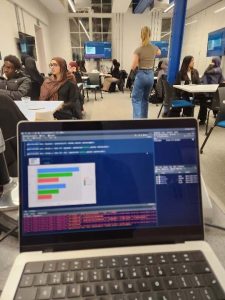Pathways to Medicine blog – by Winnie Lee and Hossam Almadhoon at the Health Protection Research Unit in Healthcare Associated Infection and Antimicrobial Resistance
Imperial’s Pathways to Medicine programme is delivered in partnership with the Sutton Trust, with support from Health Education England, to widen participation in medicine, particularly for students under-represented in higher education.
Interactive Workshops:
Two interactive workshops were conducted for school groups to illustrate the practical applications of public health and the significance of data science in medicine. These sessions introduced students to the R programming language for analysing sample data, which included patient demographics like age, sex, and outcomes. Students passed cards with patient details, mimicking how infections transmit. We then displayed the data using R, creating graphs for students to analyse. Afterwards, we had an informative chat about what we found. This allowed them to grasp its importance in monitoring infections through simulated outbreak scenarios. Overall, our workshops sparked curiosity and gave students a taste of how data can unlock insights in medicine.
Inspiring the next generation:
The “Pathways to Medicine” event gave students opportunities to be exposed to talks and workshops by researchers and medical professionals designed to inspire them to pursue different careers in medicine and STEM fields. We offered a glimpse into the power of data in medicine, with the aim to cultivate the next generation of healthcare professionals, who will positively impact society through contributing to advancements in disease prevention.
Conclusion:
The “Pathways to Medicine” event was successful in bridging the gap between academia and aspiring healthcare professionals. Through active participation, students effectively communicated fundamental aspects of their aspired careers and fostered interest in infectious diseases. Additionally, the event led to the development of engaging activities centred around data science, which hold potential for future use. As researchers, we are proud to have been part of this event and look forward to the contributions of these aspiring healthcare professionals.
